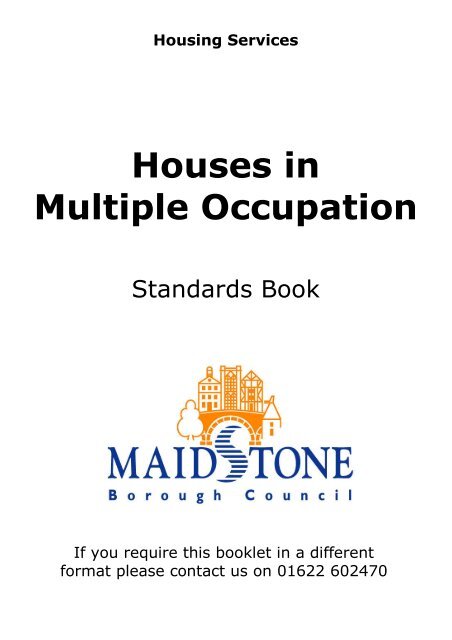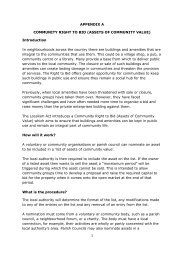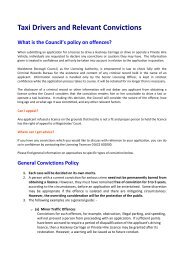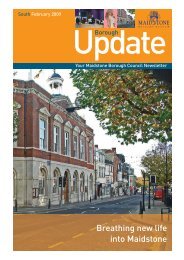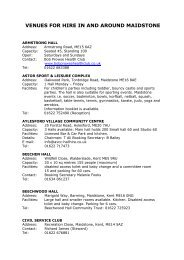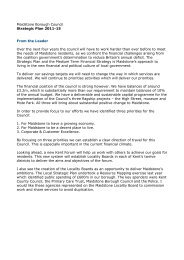HMO standards booklet - Maidstone Borough Council
HMO standards booklet - Maidstone Borough Council
HMO standards booklet - Maidstone Borough Council
You also want an ePaper? Increase the reach of your titles
YUMPU automatically turns print PDFs into web optimized ePapers that Google loves.
Housing Services<br />
Houses in<br />
Multiple Occupation<br />
Standards Book<br />
If you require this <strong>booklet</strong> in a different<br />
format please contact us on 01622 602470
April 2009 Page 2
Contents<br />
What is a house in multiple occupation ................ Page 4<br />
Management of Houses in Multiple Occupation ..... Page 5<br />
Standards of Repair .......................................... Page 4<br />
Minimum Room Sizes ........................................ Page 5<br />
Amenity Standards ........................................... Page 6<br />
Fire Precautions ................................................ Page 7<br />
Licensing ......................................................... Page 8<br />
Gas Safety ....................................................... Page 9<br />
Electrical Safety................................................ Page 10<br />
Fire Safety of Furniture and Furnishings .............. Page 11<br />
Energy Efficiency .............................................. Page 12<br />
Financial Assistance .......................................... Page 13<br />
Other Assistance .............................................. Page 14<br />
Building Control & Planning ................................ Page 15<br />
Energy Performance Certificates ......................... Page 16<br />
April 2009 Page 3
What is a house in multiple occupation?<br />
The Housing Act 2004 gives the definition of a House in<br />
Multiple Occupation (<strong>HMO</strong>) but in general terms see below.<br />
A House in Multiple Occupation (<strong>HMO</strong>) is a property:<br />
a) Which is occupied by more than one household and<br />
where there is sharing of amenities, or<br />
b) Which is occupied by more than one household and it<br />
is not just split into self contained flats, or<br />
c) Which is occupied by more than one household and is<br />
split into self-contained flats which do not meet the<br />
1991 Building Regulations and where at least ⅓ of<br />
the flats are occupied under short tenancies.<br />
And is 'occupied' by persons:<br />
a) as their only or main residence , or<br />
b) as a refuge by persons escaping domestic violence, or<br />
c) during term time by students, or<br />
d) for some other purpose that is prescribed in<br />
regulations from the government.<br />
A household is defined as:<br />
a) a single person,<br />
b) a married or unmarried couple,<br />
c) a family, or<br />
d) any other relationship as specified by the government.<br />
If you own or manage an <strong>HMO</strong> you are advised to consult<br />
with Private Sector Housing regarding the requirements.<br />
April 2009 Page 4
Management of Houses in Multiple Occupation<br />
The <strong>Council</strong> aims to ensure that all <strong>HMO</strong>’s in the borough<br />
are maintained and managed in a proper manner so that<br />
tenants are able to live in safe conditions.<br />
In general every manager should ensure that the house is<br />
properly managed, and that:<br />
• The common parts (corridors, staircases, and any<br />
shared kitchens and bathrooms) are kept clean and in<br />
good repair<br />
• The heating, cooking, washing and toilet facilities are<br />
maintained in good repair and proper working order<br />
• The gas, water and electricity supplies are maintained<br />
in a safe and fully functioning condition<br />
• All living accommodation is kept in good repair<br />
• All rooms are in a clean condition at the start of a<br />
tenancy<br />
• Any fire alarms and other fire precautions are<br />
maintained in full working order<br />
• The fire escapes are kept free from obstruction<br />
• The windows are maintained in repair and good order<br />
• Any outbuildings, yards and gardens are kept in a<br />
reasonable condition<br />
• Refuse and litter is not allowed to accumulate, and<br />
suitable refuse bins are provided and maintained<br />
• A notice is displayed in the house showing the name,<br />
address and telephone number of the manager or<br />
agent<br />
April 2009 Page 5
Standards of Repair<br />
If we inspect your property and find that there is a hazard<br />
(see below for list) you will be informed. The <strong>Council</strong> has a<br />
duty to act on the worst hazards (Category 1) and a power<br />
to act on all others.<br />
Number Hazard Title<br />
1 Damp and mould growth<br />
2 Excess cold<br />
3 Excess heat<br />
4 Asbestos (and Man Made Fibres or MMF)<br />
5 Biocides<br />
6 Carbon monoxide & fuel combustion products<br />
7 Lead<br />
8 Radiation<br />
9 Uncombusted fuel gas<br />
10 Volatile Organic Compounds (VOC’s)<br />
11 Crowding and space<br />
12 Entry by intruders<br />
13 Lighting<br />
14 Noise<br />
15 Domestic hygiene, pests and refuse<br />
16 Food safety<br />
17 Personal hygiene, sanitation and drainage<br />
18 Water supply<br />
19 Falls associated with baths etc<br />
20 Falling on level surfaces etc<br />
21 Falling on stairs etc<br />
22 Falling between levels<br />
23 Electrical hazards<br />
24 Fire<br />
25 Flames, hot surfaces etc<br />
26 Collision and entrapment<br />
27 Explosions<br />
28 Position and operability of amenities<br />
29 Structural collapse and falling elements<br />
April 2009 Page 6
Minimum Room Sizes<br />
The <strong>Council</strong> has adopted minimum room size <strong>standards</strong><br />
depending on the type of <strong>HMO</strong>.<br />
Minimum room sizes<br />
Use of room 1 person 2 persons<br />
Sleeping area (individual) 9.0m² (100ft) 14.0m² (150ft)<br />
Kitchen area (individual) 4.5m² (50ft) 4.5m² (50ft)<br />
Use of room 1-5 persons 6-10 persons<br />
Living area (shared) 11m² (120ft) 16.5m² (180ft)<br />
Kitchen (shared) 7m² (75ft) 10.0m² (110ft)<br />
Kitchen/diner (shared) 11.5m² (125ft) 19.5m² (210ft)<br />
Rooms are measured from wall to wall discounting any<br />
projection into the floor area and any floor area with a<br />
ceiling height of less than 1500mm.<br />
A person is determined by age, therefore a child under 1<br />
is discounted as a person, children aged 1 to 10 are<br />
treated as ½ a person and those 11 or over as one<br />
person.<br />
The <strong>Council</strong> does not consider single rooms to be suitable<br />
for more than two persons.<br />
April 2009 Page 7
Amenity Standards<br />
Facilities within <strong>HMO</strong>’s are required to meet certain<br />
<strong>standards</strong> depending on the number of occupants. The<br />
facilities should be in a convenient position to enable<br />
people to use them comfortably.<br />
Bath / Shower<br />
Toilet<br />
Wash Hand<br />
Basin<br />
Cooker<br />
Sink<br />
Worktop<br />
Food Storage<br />
Refrigerator<br />
Electrical<br />
Sockets<br />
1 bath (min length 1670mm)<br />
shared by up to 5 persons, or<br />
1 shower (min size 800 x 800mm)<br />
shared by up to 5 persons<br />
1 toilet with wash hand basin<br />
shared by up to 5 persons<br />
1 basin (min size 560 x 430mm)<br />
shared by up to 5 persons<br />
2 hot rings plus grill and oven per unit, or<br />
4 hot rings plus grill & oven<br />
shared by up to 5 persons<br />
1 sink & drainer with hot & cold water<br />
per unit, or<br />
1 sink & drainer with hot & cold water<br />
shared by up to 5 persons<br />
Minimum size 1000 x 500 mm per unit, or<br />
Minimum size 2000 x 500 mm<br />
shared by up to 5 persons<br />
1 standard base unit (not sink unit)<br />
per person<br />
1 standard size fridge with freezer per<br />
unit, or<br />
1 standard sized fridge and freezer<br />
shared by up to 5 persons<br />
2 free electrical sockets above worktop<br />
per unit, or<br />
4 free electrical sockets above worktop<br />
shared by up to 5 persons<br />
April 2009 Page 8
Fire Precautions<br />
People who live in Houses in Multiple Occupation are at a<br />
greater risk of dying in a fire than those who live in a<br />
house occupied by a family.<br />
Fire safety is an important aspect of the <strong>Council</strong>’s<br />
involvement with <strong>HMO</strong>s. The <strong>Council</strong> requires landlords to<br />
improve the level of fire precautions if they do not meet<br />
an acceptable standard.<br />
All properties are assessed on an individual basis; please<br />
contact the <strong>Council</strong> to arrange a visit before you carry out<br />
any works. The <strong>Council</strong> consults with the Kent Fire and<br />
Rescue Service to determine the level of fire precautions<br />
and means of escape required.<br />
In general there should be:<br />
• A mains powered smoke detection system, the size and<br />
type will be dependant on the size and type of the <strong>HMO</strong>.<br />
• A fire blanket fixed to a wall in each kitchen.<br />
• A 2kg dry powder fire extinguisher fixed to a wall in each<br />
kitchen.<br />
• A non-key operated lock to all doors.<br />
In addition for larger properties we may require:<br />
• 30 minutes fire resistance to walls and ceilings.<br />
• Fire doors to the rooms off the staircase and landings.<br />
• Emergency lighting at all changes of direction and level.<br />
• 9 litre water fire extinguishers on each level of the property.<br />
April 2009 Page 9
Licensing<br />
The Housing Act 2004 (effective from April 2006) places a<br />
duty on all landlords with properties which have three or<br />
more stories (including basement and attics) and that are<br />
occupied by five or more persons in at least two or more<br />
households to licence them with local authorities.<br />
We recommend that you contact us if your property meets<br />
the above criteria. We will then tell you if the property<br />
needs a licence and how to apply for one.<br />
The licence will:<br />
• Last for five years.<br />
• Specify the maximum number of occupants that the<br />
property can contain at any one time.<br />
• Include conditions.<br />
If the responsible person fails to:<br />
• Licence the property there may be a fine of up to<br />
£20,000 and rent may be recovered by the tenant.<br />
• Keep the number of persons in occupation to the<br />
maximum specified in the licence there may be a fine<br />
of up to £20,000.<br />
• Keep to the conditions there may be a fine of up to<br />
£5,000 (per breach).<br />
April 2009 Page 10
Gas Safety<br />
Any appliance which burns a fossil fuel (such as gas, coal,<br />
or oil) has the potential to produce carbon monoxide (CO).<br />
CO is a poisonous gas which has no smell, colour, or taste<br />
and which is responsible for the deaths of around 60<br />
people each year. The symptoms of CO poisoning are easily<br />
mistaken for those of other commonplace illnesses such as<br />
colds or flu.<br />
Under the Gas Safety (Installation and Use) Regulations<br />
1998, all landlords have a duty to ensure:<br />
• That gas appliances provided within rented<br />
accommodation are properly maintained<br />
• All gas appliances must be checked for gas safety at<br />
least once every 12 months<br />
• All works to gas appliances must, by law, be carried<br />
out by Gas Safe Registered Contractor<br />
• Tenants must be provided with copies of the Gas<br />
Safety Certificate within 28 days of the safety check<br />
being completed<br />
Failure to ensure that the gas appliances are checked for<br />
gas safety as required by the Regulations is an offence<br />
which is enforced by the Health and Safety Executive<br />
(HSE).<br />
Any person who carries out works to gas appliances<br />
must be Gas Safe Registered and should carry an<br />
identity card. If you would like to check a gas<br />
installer’s Gas Safe Registration please call 0800<br />
408 5500.<br />
April 2009 Page 11
Electrical Safety<br />
There are a number of measures that can be taken to<br />
ensure the safety of the electrical installation:<br />
• Electrical repairs must be carried out by competent<br />
persons – ideally an electrician registered with the<br />
NICEIC (National Inspection <strong>Council</strong> for Electrical<br />
Installation Contracting) or the ECA (the Electrical<br />
Contractors Association) and be in compliance with the<br />
Building Regulations.<br />
• The installation should be inspected periodically by a<br />
competent electrician.<br />
• Periodic Inspection Reports for the electrical<br />
installation should be carried out at a minimum of five<br />
yearly intervals. The report will certify that there are<br />
no dangerous defects.<br />
• All fire alarm, smoke detection and emergency lighting<br />
systems should be inspected periodically (as per<br />
guidance) by a competent electrician.<br />
• Sufficient electrical sockets outlets should be provided<br />
to prevent overloading and the use of trailing<br />
extension cables. The following number of double<br />
sockets should be provided:<br />
4 sockets in the kitchen<br />
3 sockets in the living room<br />
2 sockets in the bedroom<br />
1 socket in the hallway and landing(s)<br />
Where electrical installations are found to be hazardous<br />
the <strong>Council</strong> may serve notices on landlords requiring<br />
remedial works to remove the risk to the tenants.<br />
April 2009 Page 12
Fire Safety of Furniture and Furnishings<br />
The Furniture and Furnishings (Fire) (Safety) Regulations<br />
1988, set levels of fire resistance for domestic upholstered<br />
furnishings. These regulations are enforced by Trading<br />
Standards Officers from Kent County <strong>Council</strong>.<br />
Upholstered furniture filled with polyurethane foam tends<br />
to burn quickly and gives off large amounts of smoke and<br />
poisonous fumes. Older or second-hand furniture can only<br />
be used if it has the appropriate label showing that it is<br />
cigarette and match resistant.<br />
The Regulations apply to:<br />
• Beds, mattresses, headboards and pillows<br />
• Sofa beds, futons, scatter cushions and seat pads<br />
• Loose and stretch covers for furniture<br />
The Regulations do not apply to:<br />
• Sleeping bags or loose covers for mattresses<br />
• Bed clothes, duvets and pillow cases<br />
• Carpets and curtains<br />
New furniture that complies with the regulations is sold<br />
with a permanent label stating that it is cigarette and<br />
match resistant. Landlords should ensure that they do not<br />
let accommodation with furniture that is not fire resistant.<br />
April 2009 Page 13
Energy Efficiency<br />
An energy efficient house is more comfortable to live in and<br />
costs less money to run. The advantages of an energy<br />
efficient house include:<br />
• Increased asset value of the property<br />
• Reduced maintenance and redecoration costs for the<br />
landlord<br />
• Increased tenant satisfaction and fewer complaints<br />
• Reduced problems<br />
Energy saving tips:<br />
• Lag the hot water tanks and hot water pipes<br />
• Use energy saving light bulbs which last longer and use<br />
less electricity<br />
• Have at least 250mm (10 inches) of loft insulation<br />
• Draught proof external doors and windows<br />
• When the boiler needs replacing choose an energy<br />
efficient one<br />
• When the windows need replacing choose double<br />
glazing<br />
• Replace old storage heaters with the modern energy<br />
efficient ones<br />
For more information on Energy Efficiency measures,<br />
grants and discounts contact the Energy Savings Trust<br />
on 0800 512 012.<br />
April 2009 Page 14
Landlords grants<br />
Financial Assistance<br />
A discretionary grant may be available to landlords owning<br />
Houses in Multiple Occupation, specifically for the<br />
installation of fire precautions and amenities to meet the<br />
<strong>Council</strong>’s <strong>standards</strong>. The assistance is set at 75% of the<br />
eligible cost of the work up to a maximum of £10,000 per<br />
house, £7,000 per flat, or £5,000 per bedsit.<br />
Empty homes grants<br />
A discretionary grant may be available to landlords owning<br />
empty houses, helping them bring them back into use or<br />
converting commercial premises into good quality dwellings<br />
to let. The assistance is set at 75% of the eligible cost of<br />
the works up to a maximum of £10,000 per unit of<br />
accommodation.<br />
Heating & Insulation<br />
Financial assistance up to £7,000 may be available for<br />
installing heating and insulation. To qualify the tenant<br />
must be at least on one of the following:<br />
• Income Support<br />
• Guarantee Credit (Part of Pension Credit)<br />
• <strong>Council</strong> Tax Benefit (not single persons discount)<br />
• Housing Benefit<br />
• Income Based Job Seekers Allowance<br />
• Working Tax Credit (with an income of less than £15,050)<br />
• Child Tax Credit (with an income of less than £15,050)<br />
The tenant may also qualify if they are retired and their<br />
State Retirement Pension is their main source of income.<br />
April 2009 Page 15
Property Management<br />
Other Assistance<br />
Help with the management of the property may be found<br />
through Avenue Lettings & Management Ltd who offer a<br />
private sector or local authority leasing scheme.<br />
This involves Avenue taking control of the management of<br />
the property for a fixed period and they in return will give a<br />
guaranteed monthly income. For more information contact<br />
Avenue Lettings on 01795 434 646.<br />
Rent Deposit Bond Scheme<br />
The <strong>Council</strong> has set up a Rent Deposit Guarantee Scheme<br />
intended for people who cannot afford the deposit for the<br />
tenancy. The scheme gives landlords a legally binding bond<br />
agreement signed by the tenant, the landlord and the<br />
<strong>Council</strong>. The bond will normally be 6 weeks rent up to a<br />
maximum of £850.<br />
The bond will cover damage by the tenant(s) and their<br />
household, rent arrears to the amount of the bond and<br />
cleaning costs. The bond will not cover wear and tear,<br />
unpaid bills, personal debts, damage or loss of contents to<br />
the communal areas of the property.<br />
The advantages of the scheme are:<br />
• Advice and assistance can be given on the rights and<br />
responsibilities of tenants and landlords.<br />
• Reduced advertising costs for landlords<br />
• Advice given on the Housing Benefit System.<br />
For more information call the Rent Deposit Officer on<br />
01622 602274.<br />
April 2009 Page 16
Building Control and Planning<br />
Building Regulations are designed to protect the health<br />
and safety of people living in or near a building, and<br />
includes controlling structural stability, drainage and<br />
means of escape in case of fire.<br />
Building Regulations approval is required for:<br />
• New building work<br />
• Conversion of a building into flats<br />
• Installing toilets, sinks, baths, showers etc<br />
• Replacement windows<br />
• Replacement heating systems<br />
• Structural alterations including removing load bearing<br />
walls<br />
If a person intends to carry out works which may require<br />
Building Control approval they should contact Building<br />
Surveying on 01622 602701 to discuss their plans.<br />
Planning<br />
Planning permission may be required for any external<br />
alterations, extensions, or to change the use of a house<br />
into a house in multiple occupation. The owner of the<br />
property should contact the <strong>Council</strong>’s Planning<br />
Department on 01622 602300 for further information.<br />
April 2009 Page 17
Energy Performance Certificates<br />
From 1 st October 2008 Energy Performance Certificates will<br />
be required to be given to all new tenants (and prospective<br />
tenants).<br />
An Energy Performance Certificate gives owners, tenants<br />
and buyers information on the energy efficiency of their<br />
property. It gives the building a standard energy and<br />
carbon emission efficiency grade from ‘A’ to ‘G’, (‘A’ being<br />
the best). The certificate shows the current efficiency<br />
rating and gives a potential future rating subject to<br />
improvements being made to the property. The Certificate<br />
will cost in the region of £100 and has to be commissioned<br />
by an accredited Domestic Energy Assessor.<br />
To find a Domestic Energy Assessor visit<br />
www.whatstheidea.net or www.ihi.org.uk. Enforcement of<br />
Certificates will be carried out by Trading Standards. More<br />
information about the legislation can be found on<br />
www.communities.gov.uk. For energy saving advice visit<br />
www.energysavingtrust.org.uk.<br />
Deposit Protection<br />
As from 6 th April 2007, all landlords and letting agents<br />
taking deposits for Assured Shorthold Tenancies (ASTs) in<br />
England and Wales must safeguard them with a<br />
Government-authorised tenant deposit protection scheme.<br />
The legislation covers virtually all new AST contracts<br />
through which private landlords let property in England and<br />
Wales. However, the following will not need to be<br />
registered with a tenancy deposit protection scheme:<br />
• Resident landlords (those living in the property)<br />
• Landlords of properties with rent over £25,000 a year<br />
• Company lets<br />
• Accommodation provided by Universities or colleges<br />
April 2009 Page 18
April 2009 Page 19
Contact Numbers<br />
<strong>Maidstone</strong> <strong>Borough</strong> <strong>Council</strong>:<br />
Building Surveying<br />
<strong>Council</strong> Tax<br />
Housing Benefits<br />
Housing Options<br />
Planning Enquiries<br />
Private Sector Housing<br />
Refuse & Recycling Collection<br />
Other Agencies:<br />
Avenue Lettings<br />
Citizens Advice Bureau<br />
Energy Savings Trust<br />
Gas Emergency<br />
Gas Safe Register<br />
Kent Fire & Rescue Service<br />
Kent Police<br />
Kent Trading Standards<br />
Private Sector Housing<br />
<strong>Maidstone</strong> <strong>Borough</strong> <strong>Council</strong><br />
<strong>Maidstone</strong> House<br />
King Street<br />
<strong>Maidstone</strong><br />
ME15 6JQ<br />
01622 602 000<br />
01622 602 701<br />
01622 602 003<br />
01622 602 710<br />
01622 602 203<br />
01622 602 300<br />
01622 602 470<br />
01622 602 162<br />
01795 434 646<br />
01622 757 882<br />
0800 512 012<br />
0800 111 999<br />
0800 408 500<br />
01622 774 160<br />
01622 677 055<br />
08457 585 497<br />
t 01622 602 470<br />
e privatesectorhousing@maidstone.gov.uk<br />
w www.digitalmaidstone.co.uk<br />
April 2009 Page 20


